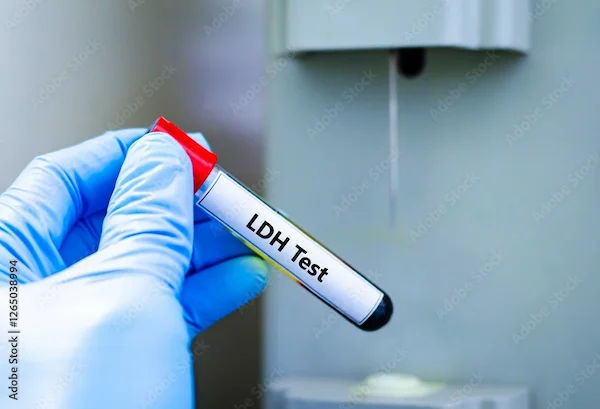How To Reduce Ldh Level?
Learn how to reduce high LDH (lactate dehydrogenase) levels through proper diagnosis, medical treatment, and lifestyle changes that support healthy cellular function.

Written by Dr.Sonia Bhatt
Last updated on 3rd Jul, 2025

Introduction
Lactate dehydrogenase (LDH) is an enzyme found in almost all body tissues, including the heart, liver, muscles, kidneys, and lungs. It plays a crucial role in energy production. However, high LDH levels in the blood may indicate tissue damage or disease. If your recent blood test shows elevated LDH levels, don’t panic—there are ways to bring them down naturally.
In this article, we’ll explore what LDH is, why high levels can be concerning, and practical steps to reduce them through lifestyle changes, diet, and medical guidance.
Understanding LDH and Its Importance
LDH helps convert sugar into energy when oxygen levels are low, such as during intense exercise. Normally, LDH is present inside cells, but when tissues are damaged (due to injury, infection, or disease), the enzyme leaks into the bloodstream, raising LDH levels.
Common Causes of High LDH Levels
Several factors can contribute to elevated LDH, including:
Muscle injury (intense workouts, trauma)
Liver disease (hepatitis, cirrhosis)
Heart conditions (heart attack, heart failure)
Lung diseases (pneumonia, pulmonary embolism)
Blood disorders (anemia, hemolysis)
Certain cancers (leukemia, lymphoma)
Infections (viral or bacterial)
If your LDH is high, your doctor may recommend further tests to identify the underlying cause.
How to Lower LDH Levels Naturally?
While treating the root cause is essential, certain lifestyle and dietary changes can help reduce LDH levels.
1. Stay Hydrated
Dehydration can concentrate LDH in the blood. Drinking enough water helps flush out toxins and supports kidney function, indirectly aiding in LDH regulation.
Tip: Aim for 8-10 glasses of water daily.
For LDH Level Reduction Consult Top General Physicians
2. Eat a Balanced, Anti-Inflammatory Diet
Certain foods can help reduce inflammation and tissue damage, which may lower LDH levels.
Foods to Include:
Leafy greens (spinach, kale): Rich in antioxidants.
Berries (blueberries, strawberries): Fight oxidative stress.
Fatty fish (salmon, mackerel): High in omega-3s, reducing inflammation.
Nuts and seeds (almonds, flaxseeds): Support heart and liver health.
Whole grains (oats, quinoa): Provide steady energy without spiking blood sugar.
Foods to Avoid:
Processed foods (chips, fried snacks): Increase inflammation.
Sugary drinks (soda, energy drinks): Can worsen liver function.
Excessive alcohol: Damages liver cells, raising LDH.
3. Exercise Moderately
While intense workouts can temporarily raise LDH due to muscle breakdown, moderate exercise helps improve circulation and overall health.
Tip: Opt for low-impact activities like walking, swimming, or yoga.
4. Manage Stress
Chronic stress increases inflammation and may contribute to tissue damage.
Tip: Practice relaxation techniques like deep breathing, meditation, or mindfulness.
5. Get Enough Sleep
Poor sleep can affect cell repair and increase stress hormones, potentially raising LDH.
Tip: Aim for 7-9 hours of quality sleep nightly.
6. Avoid Smoking
Smoking damages lung tissue and increases oxidative stress, contributing to higher LDH levels.
Tip: Seek help to quit smoking if needed.
7. Monitor Underlying Health Conditions
If you have conditions like diabetes, liver disease, or anemia, managing them effectively can help control LDH levels.
Tip: Follow your doctor’s treatment plan and take prescribed medications regularly.
When to See a Doctor?
While lifestyle changes help, persistently high LDH may indicate a serious condition. Consult a doctor if you experience:
Unexplained fatigue
Muscle weakness
Yellowing of skin (jaundice)
Shortness of breath
Persistent pain
Your doctor may recommend additional tests (like liver function tests, imaging, or biopsies) to determine the cause.
Can Medications Help Lower LDH?
There’s no direct medication to reduce LDH- treatment depends on the underlying issue. For example:
Liver disease: Medications to support liver function.
Anemia: Iron or vitamin supplements.
Infections: Antibiotics or antivirals.
Always follow medical advice before taking any supplements or medications.
Conclusion
High LDH levels are a sign that your body may be dealing with tissue damage or disease. While lifestyle changes like a healthy diet, hydration, and stress management can help, it’s crucial to identify and treat the root cause.
If you’re concerned about your LDH levels, consult a healthcare professional for personalized advice. You can easily book a consultation or schedule a blood test through Apollo 24|7 for a thorough check-up.
Consult Top General Physicians
For LDH Level Reduction Consult Top General Physicians

Dr. D Bhanu Prakash
General Practitioner
10 Years • MBBS, AFIH, Advanced certificate in critical care medicine, Fellowship in critical care medicine
Hyderabad
Apollo 24|7 Clinic, Hyderabad

Dr. M L Ezhilarasan
General Practitioner
6 Years • MBBS
Visakhapatnam
Apollo 24|7 Clinic - Andhra Pradesh, Visakhapatnam

Dr D M Karthik
General Practitioner
4 Years • MBBS, Fellowship in Diabetes Mellitus, Advance certificate in Diabetes Mellitus
Visakhapatnam
Apollo 24|7 Clinic - Andhra Pradesh, Visakhapatnam

Dr. Vasanthasree Nair
General Practitioner
15 Years • MBBS
Angamaly
Apollo 24|7 Clinic - Kerala, Angamaly
(425+ Patients)

Dr. J T Hema Pratima
General Practitioner
9 Years • MBBS
Chennai
Apollo 24|7 Clinic - Tamilnadu, Chennai
(250+ Patients)
Consult Top General Physicians

Dr. D Bhanu Prakash
General Practitioner
10 Years • MBBS, AFIH, Advanced certificate in critical care medicine, Fellowship in critical care medicine
Hyderabad
Apollo 24|7 Clinic, Hyderabad

Dr. M L Ezhilarasan
General Practitioner
6 Years • MBBS
Visakhapatnam
Apollo 24|7 Clinic - Andhra Pradesh, Visakhapatnam

Dr D M Karthik
General Practitioner
4 Years • MBBS, Fellowship in Diabetes Mellitus, Advance certificate in Diabetes Mellitus
Visakhapatnam
Apollo 24|7 Clinic - Andhra Pradesh, Visakhapatnam

Dr. Vasanthasree Nair
General Practitioner
15 Years • MBBS
Angamaly
Apollo 24|7 Clinic - Kerala, Angamaly
(425+ Patients)

Dr. J T Hema Pratima
General Practitioner
9 Years • MBBS
Chennai
Apollo 24|7 Clinic - Tamilnadu, Chennai
(250+ Patients)